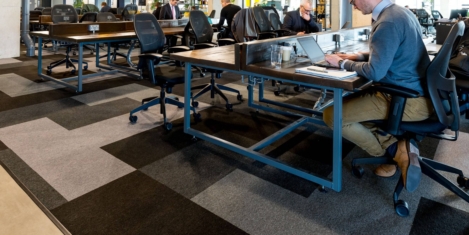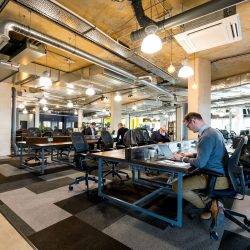July 17, 2018
Artificial intelligence will create more jobs than it displaces, claims new study
 Artificial Intelligence (AI) and related technologies are projected to create as many jobs as they displace in the UK over the next 20 years, according to new analysis by PwC. In absolute terms, around 7 million existing jobs could be displaced, but around 7.2 million could be created, giving the UK a small net jobs boost of around 0.2 million. While the overall net effect of AI on UK jobs may be broadly neutral, this varies significantly across industry sectors. The most positive effect of AI is seen in the health and social work sector, where PwC estimates that employment could increase by nearly 1 million, equivalent to around 20 percent of existing jobs in the sector. On the other hand, PwC estimates the number of jobs in the manufacturing sector could be reduced by around 25 percent, representing a net loss of nearly 700,000 jobs.
Artificial Intelligence (AI) and related technologies are projected to create as many jobs as they displace in the UK over the next 20 years, according to new analysis by PwC. In absolute terms, around 7 million existing jobs could be displaced, but around 7.2 million could be created, giving the UK a small net jobs boost of around 0.2 million. While the overall net effect of AI on UK jobs may be broadly neutral, this varies significantly across industry sectors. The most positive effect of AI is seen in the health and social work sector, where PwC estimates that employment could increase by nearly 1 million, equivalent to around 20 percent of existing jobs in the sector. On the other hand, PwC estimates the number of jobs in the manufacturing sector could be reduced by around 25 percent, representing a net loss of nearly 700,000 jobs.



















 Improved living standards, deflating pension pots and legal protection against age discrimination have all helped to nudge up the retirement age. The result is that for the first time since the Industrial Revolution five generations of employees are now working side by side. According to a new survey, two thirds of organisations (66 per cent) say that an age diverse workforce helped the company to have a more comprehensive skillset and knowledge base and more than seven in ten (71 per cent) felt that a multi-generational workforce brought contrasting views to their organisation. However, in the YouGov survey of middle market businesses commissioned by RSM, four in ten companies (41 per cent) said that a multi-generational workforce also increased the risk of conflict in the workplace.
Improved living standards, deflating pension pots and legal protection against age discrimination have all helped to nudge up the retirement age. The result is that for the first time since the Industrial Revolution five generations of employees are now working side by side. According to a new survey, two thirds of organisations (66 per cent) say that an age diverse workforce helped the company to have a more comprehensive skillset and knowledge base and more than seven in ten (71 per cent) felt that a multi-generational workforce brought contrasting views to their organisation. However, in the YouGov survey of middle market businesses commissioned by RSM, four in ten companies (41 per cent) said that a multi-generational workforce also increased the risk of conflict in the workplace. 













July 11, 2018
Challenging some of the most commonly held misconceptions about coworking
by John Williams • Comment, Coworking
(more…)